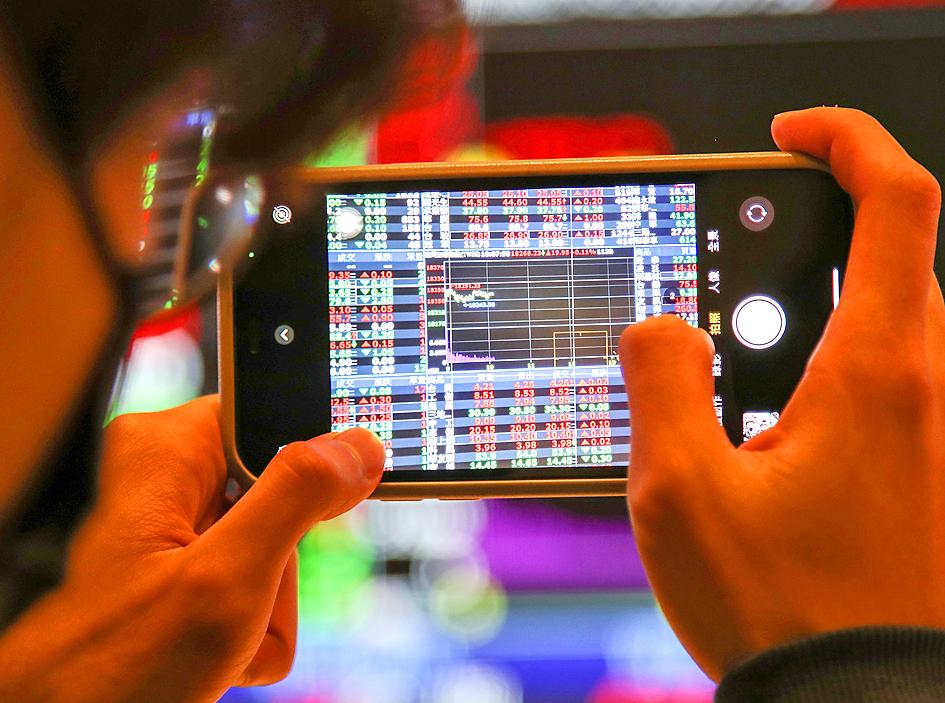The TAIEX yesterday closed at an all-time high, topping 18,500 points as the bellwether electronics sector led an upturn on the back of a rally on the US markets overnight, while contract chipmaker Taiwan Semiconductor Manufacturing Co (TSMC, 台積電) extended its momentum from a session earlier on the back of its strong fundamentals.
The TAIEX closed up 255.84 points, or 1.4 percent, at the day’s high of 18,526.35, on turnover of NT$325.112 billion (US$11.76 billion).
“Due to its heavy weighting, TSMC’s gains basically served as an anchor for the broader market,” Concord Securities Co (康和證券) analyst Kerry Huang (黃志祺) said, referring to the chipmaker’s contribution of about 210 points to the TAIEX’s rise yesterday.

Photo: CNA
After a 2.6 percent increase on Monday, TSMC rose by 3.96 percent to close at NT$656.
TSMC’s gains gave a 2.17 percent boost to the electronics sector, which closed at 903.09, while the semiconductor subindex rose 2.74 percent.
“As foreign institutional investors returned to the trading floor after the New Year holiday, they started rebuilding their portfolios by buying into TSMC,” Huang said. “Buying TSMC is basically a good way to lift the TAIEX.”
Foreign institutional investors bought a net NT$25.71 billion of shares on the main board after net purchases of NT$15.53 billion on Monday, TAIEX data showed.
TSMC’s buying spread to other semiconductor stocks, with integrated circuit designer MediaTek Inc (聯發科) up 1.30 percent to close at NT$1,165 and IC packaging and testing services provider ASE Technology Holding Co (日月光投控) rising 1.42 percent to close at NT$107.
Bucking the upturn, United Microelectronics Corp (聯電), a smaller contract chipmaker, fell 0.63 percent to close at NT$63.
Largan Precision Co (大立光), a supplier of smartphone camera lenses to Apple Inc, made a strong showing due to bargain hunting, Huang said.
“Largan had been in consolidation mode for a long time and has become technically stable,” he said. “Its relatively low valuation appears attractive for the moment.”
Largan rose 7.8 percent to close at NT$2,695.
Also in the electronics sector, iPhone assembler Hon Hai Precision Industry Co (鴻海精密) rose 0.49 percent to close at NT$103.5, while Yageo Corp (國巨), the world’s third-largest maker of multi-layer ceramic capacitors, soared 8.55 percent to close at NT$533.
“As the electronics sector accounted for more than 70 percent of Tuesday’s total turnover, old-economy stocks were largely marginalized throughout the session,” Huang said.
“Foreign institutional investors are expected to continue to rebuild their positions on the local main board after their massive sell-off last year, but, local investors should watch whether the market will see overshooting in the short term, which would result in volatility,” Huang said.

Micron Memory Taiwan Co (台灣美光), a subsidiary of US memorychip maker Micron Technology Inc, has been granted a NT$4.7 billion (US$149.5 million) subsidy under the Ministry of Economic Affairs A+ Corporate Innovation and R&D Enhancement program, the ministry said yesterday. The US memorychip maker’s program aims to back the development of high-performance and high-bandwidth memory chips with a total budget of NT$11.75 billion, the ministry said. Aside from the government funding, Micron is to inject the remaining investment of NT$7.06 billion as the company applied to participate the government’s Global Innovation Partnership Program to deepen technology cooperation, a ministry official told the

Taiwan Semiconductor Manufacturing Co (TSMC, 台積電), the world’s leading advanced chipmaker, officially began volume production of its 2-nanometer chips in the fourth quarter of this year, according to a recent update on the company’s Web site. The low-key announcement confirms that TSMC, the go-to chipmaker for artificial intelligence (AI) hardware providers Nvidia Corp and iPhone maker Apple Inc, met its original roadmap for the next-generation technology. Production is currently centered at Fab 22 in Kaohsiung, utilizing the company’s first-generation nanosheet transistor technology. The new architecture achieves “full-node strides in performance and power consumption,” TSMC said. The company described the 2nm process as

Shares in Taiwan closed at a new high yesterday, the first trading day of the new year, as contract chipmaker Taiwan Semiconductor Manufacturing Co (TSMC, 台積電) continued to break records amid an artificial intelligence (AI) boom, dealers said. The TAIEX closed up 386.21 points, or 1.33 percent, at 29,349.81, with turnover totaling NT$648.844 billion (US$20.65 billion). “Judging from a stronger Taiwan dollar against the US dollar, I think foreign institutional investors returned from the holidays and brought funds into the local market,” Concord Securities Co (康和證券) analyst Kerry Huang (黃志祺) said. “Foreign investors just rebuilt their positions with TSMC as their top target,

POTENTIAL demand: Tesla’s chance of reclaiming its leadership in EVs seems uncertain, but breakthrough in full self-driving could help boost sales, an analyst said Chinese auto giant BYD Co (比亞迪) is poised to surpass Tesla Inc as the world’s biggest electric vehicle (EV) company in annual sales. The two groups are expected to soon publish their final figures for this year, and based on sales data so far this year, there is almost no chance the US company led by CEO Elon Musk would retain its leadership position. As of the end of last month, BYD, which also produces hybrid vehicles, had sold 2.07 million EVs. Tesla, for its part, had sold 1.22 million by the end of September. Tesla’s September figures included a one-time boost in